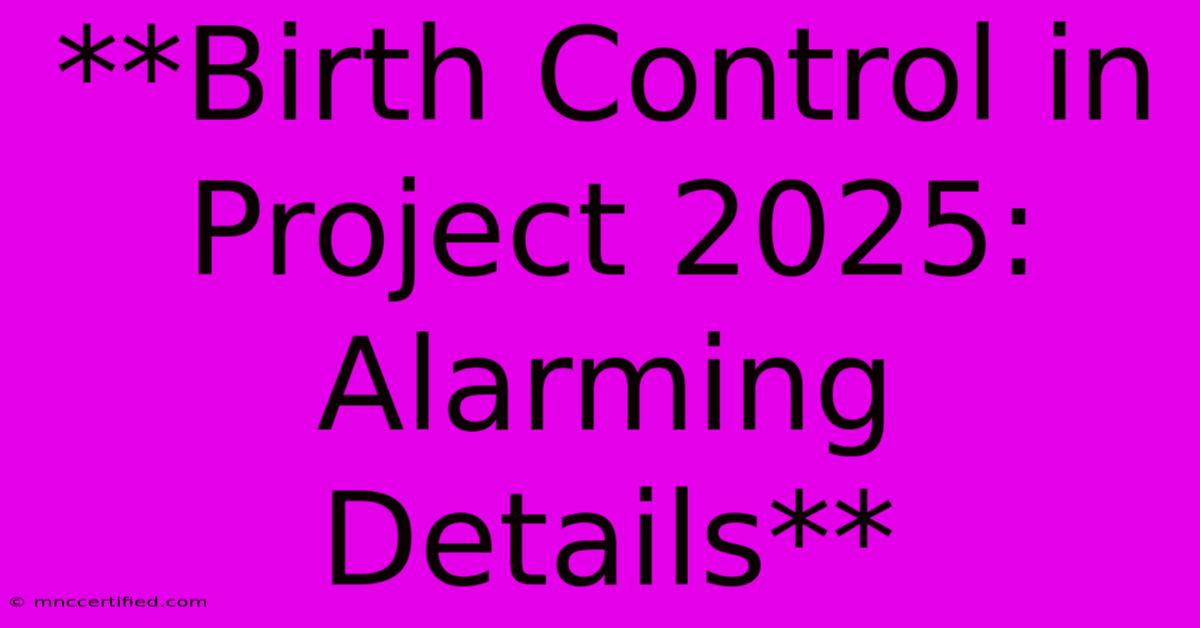**Birth Control In Project 2025: Alarming Details**

Table of Contents
Birth Control in Project 2025: Alarming Details? Separating Fact from Fiction
The internet is awash with conspiracy theories, and "Project 2025" and its alleged connection to birth control is no exception. This article aims to debunk these claims, providing factual information and addressing the concerns surrounding this topic.
The "Project 2025" Conspiracy: What is it?
The "Project 2025" conspiracy theory revolves around the idea that a secret, nefarious organization is planning to implement population control measures through forced sterilization or widespread birth control distribution, all by the year 2025. The theory often cites vague sources, linking to unverified websites and anonymous social media posts.
It's crucial to understand that these claims lack credible evidence. No reputable scientific or governmental organizations have validated or supported the existence of "Project 2025" or its alleged agenda.
Understanding Population Control and Birth Control
The idea of population control is often misconstrued. While some governments have implemented policies to limit population growth in the past, this is usually done through education, access to family planning services, and economic incentives, not forced sterilization or hidden agendas.
Birth control, on the other hand, is a widely accepted and essential aspect of reproductive healthcare. It empowers individuals to make informed decisions about their reproductive choices, leading to better health outcomes and improved social and economic wellbeing.
Deconstructing the Myths
The claims associated with "Project 2025" often rely on the following:
- Misinterpretation of data: Data on population trends or family planning initiatives is often twisted to support the conspiracy.
- Fearmongering and sensationalism: The use of dramatic language and false claims generates fear and anxiety, making the theory seem more believable.
- Lack of credible sources: The lack of credible evidence and reliance on anonymous sources raises serious questions about the validity of the information.
It's important to be critical of information found online, especially when it's presented with an emotional slant and lacks verifiable evidence.
Why is it Important to Address these Conspiracy Theories?
Conspiracy theories like "Project 2025" can have negative real-world consequences:
- Erosion of trust in legitimate institutions: By spreading misinformation and casting doubt on public health initiatives, these theories undermine trust in governments, health organizations, and scientists.
- Discouragement of individuals from accessing essential healthcare: The false narrative around "Project 2025" can discourage individuals from seeking reproductive healthcare services, including birth control.
- Increased stigma and discrimination: The conspiracy theory can perpetuate harmful stereotypes and prejudices against individuals who choose to use birth control.
The Importance of Fact-Checking and Critical Thinking
The internet offers a wealth of information, but it also allows for the spread of misinformation. It's crucial to develop critical thinking skills and fact-checking habits:
- Verify sources: Look for reputable sources like government websites, established medical organizations, and peer-reviewed research.
- Consider the evidence: Evaluate the claims presented and look for supporting evidence.
- Be aware of biases: Recognize that information can be biased, and consider different perspectives.
Remember, the goal is to be an informed and discerning consumer of information, not blindly accepting everything you read online.
Conclusion
The "Project 2025" conspiracy theory is a prime example of how misinformation can spread quickly and harmfully. By promoting critical thinking, fact-checking, and reliance on credible sources, we can help to combat these harmful narratives and ensure people have access to accurate information about reproductive health and family planning. Remember, when it comes to your health, always trust reputable sources and speak to your doctor or healthcare provider for information and advice.

Thank you for visiting our website wich cover about **Birth Control In Project 2025: Alarming Details**. We hope the information provided has been useful to you. Feel free to contact us if you have any questions or need further assistance. See you next time and dont miss to bookmark.
Featured Posts
-
Disability Insurance Lawyer North Carolina
Nov 07, 2024
-
Californias Prop 36 Criminal Justice Reform Passes
Nov 07, 2024
-
Trump Victory Fuels Dogecoin Memecoin Rally
Nov 07, 2024
-
Bayern Vs Benfica Starting Xis Confirmed
Nov 07, 2024
-
Daniel Barlow Height Pictures Reveal His Size
Nov 07, 2024